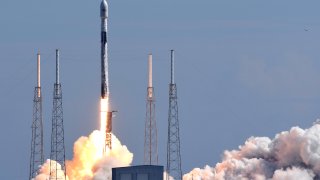
- The Federal Communications Commission approved SpaceX's proposed modification of its Starlink license on Tuesday, a win for Elon Musk's growing satellite internet network.
- SpaceX filed the modification request a year ago, asking to move upcoming satellites to an altitude of under 570 km.
- Opponents filed numerous responses to SpaceX's proposed modification, with companies including Amazon saying it would cause interference with other satellite networks.
The Federal Communications Commission on Tuesday approved SpaceX's proposed modification of its Starlink satellite license, a win for Elon Musk's growing broadband network despite objections from competitors including Amazon and Viasat, among others.
"We conclude that grant of the SpaceX Third Modification Application will serve the public interest," the FCC wrote in the order. "Our action will allow SpaceX to implement safety-focused changes to the deployment of its satellite constellation to deliver broadband service throughout the United States, including to those who live in areas underserved or unserved by terrestrial systems."
SpaceX filed the modification request a year ago. The company requested that, after its first 1,584 satellites are in orbit, it change the next 2,814 satellites to an altitude of under 570 km from its previous plan of an altitude above 1,100 km. The FCC's approval comes at a key moment for SpaceX, as the company has nearly 1,400 satellites in orbit and likely would have had to halt its rapid launch campaign without the FCC's authorization.
Get top local stories in DFW delivered to you every morning. >Sign up for NBC DFW's News Headlines newsletter.
Musk, in a tweet responding to the agency's decision, said the "FCC is fair & sensible," emphasizing that "99.9% of the time, I agree with regulators."
"On rare occasions, we disagree. This is almost always due to new technologies that past regulations didn't anticipate."
Starlink is the company's capital-intensive project to build an interconnected internet network with thousands of satellites — known in the space industry as a constellation — designed to deliver high-speed internet to consumers anywhere on the planet.
Money Report
Opponents filed numerous responses to SpaceX's proposed modification, with companies including Amazon saying it would cause interference with other satellite networks. SpaceX's competitors also argued the change was too significant for the FCC to treat it as a simple modification, saying it should instead be included in a broader processing round with new satellite systems.
The FCC dispute between SpaceX and Amazon spilled into public view in January, when Musk took to Twitter to allege his competitor is attempting "to hamstring Starlink," adding that Kuiper "is at best several years away from operation." While Amazon has yet to announce when its first Kuiper satellites will launch, the FCC's authorization of the system last year requires that the company deploy half of its planned satellites within six years. That represents Amazon deploying about 1,600 satellites in orbit by July 2026.
While Amazon filed multiple objections to SpaceX's modification, the tech giant called the FCC's ruling "a positive outcome" because it "places clear conditions on SpaceX," an Amazon spokesperson said in a statement to CNBC.
"These conditions address our primary concerns regarding space safety and interference, and we appreciate the Commission's work to maintain a safe and competitive environment in low earth orbit," Amazon said.
More broadly, the FCC denied the claims from other companies of signal interference in its approval of SpaceX's modification.
"We further conclude that this modification does not create significant interference problems that would warrant treatment of SpaceX's system as if it were filed in a later processing round," the FCC wrote.
The FCC's order requires that SpaceX issue a report twice a year that includes the number of Starlink conjunction events – meaning near misses with other satellites – in the past six months, as well as the number of Starlink satellites that were disposed of or re-entered the Earth's atmosphere.






